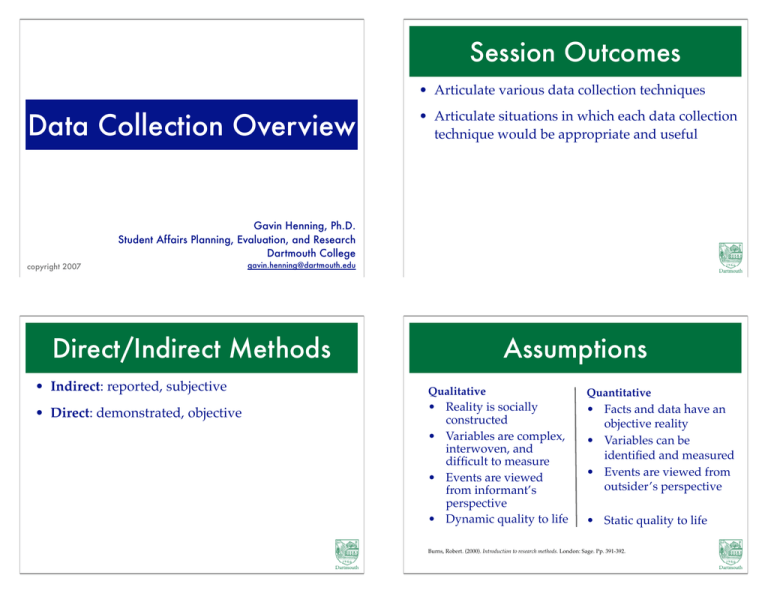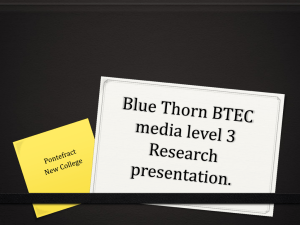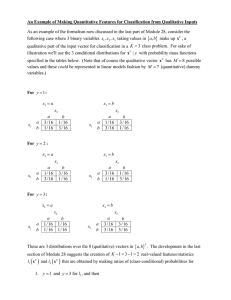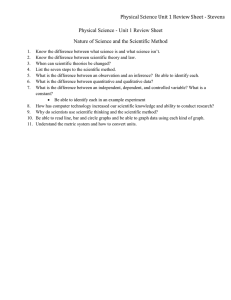Data Collection Overview Session Outcomes
advertisement

Session Outcomes • Articulate various data collection techniques Data Collection Overview • Articulate situations in which each data collection technique would be appropriate and useful Gavin Henning, Ph.D. Student Affairs Planning, Evaluation, and Research Dartmouth College copyright 2007 gavin.henning@dartmouth.edu Direct/Indirect Methods • Indirect: reported, subjective • Direct: demonstrated, objective Assumptions Qualitative Quantitative • Reality is socially constructed • Variables are complex, interwoven, and difficult to measure • Events are viewed from informant’s perspective • Dynamic quality to life • Facts and data have an objective reality • Variables can be identified and measured • Events are viewed from outsider’s perspective • Static quality to life Burns, Robert. (2000). Introduction to research methods. London: Sage. Pp. 391-392. Quantitative Collection Tracking • Tracking • Simply tracking individuals served/impacted • Experiments • Important to gather data in detailed way for future analysis • Surveys • Testing instrument • Checklists • Helpful to have an ID number to connect to other institutional databases • Need a systematic electronic format (i.e., database) • Rubrics Experiments Experiments • Seek to control varibles by assessment design Examples • Can give confident results when implemented • Impact of two different forms of alcohol education • Can be resource intensive • Not used often in education • Pre-post test is most popular design • Effectiveness of roommate matching • Impact of employee training for student employees in the student union Surveys • Can be paper or electronic • SNAP, SurveyMonkey, and Zoomerang • Used to collect data from many people quickly and easily Surveys Examples • To understand satisfaction with new health insurance plan • Limited resources needed • To gather data to determine effectiveness of residence hall staff members • Unfortunately, this is default approach in higher education • To understand the characteristics of incoming students Testing Instruments • Use of pre-created instruments to measure particular traits or domains • Example: Myers-Briggs Type Indicator, Moral Development Inventory, Collegiate Learning Assessment (CLA), Measure of Academic Proficency and Progress (MAPP), etc. • Participants given score and compared to normative data • Can be useful if measuring a specific area Testing Instruments Examples • To measure the moral development of students going through the judicial system • To measure studnets’ critical thinking before entering Dartmouth and when they leave • To measure the personality types of student leaders so they can understand how their personality affects their leadershiop style. Checklists • Can be used by collector or collectee to identify actions or activities that have occurred or taken place • Often incorporated into surveys • Only indicate existence, not any judgement Checklists Mark group leadership characteristics candidate demonstrated: Listened to others Summarized what was said Tried to reconcile differing opinions Resolved conflicts Tried to build consensus Helped group move forward Checklists Mark the activities you attended during orientation: Meeting with Dean Meeting with Advisor “Real Buzz” “Consensual Sex is Hot” “Experiences” Casino Night Alumni Dinner Off Campus Program Rubrics • Set of criteria used to judge student demonstration of learning • Completed by a rater, not student • Can be holistic or component • Can be an effective assessment tool, but underutilized in student affairs Stevens, D. D., and Levi, A. J. (2005). Introduction to rubrics: An assesment tool to save grading time, convey effective feedback, and promote student learning. Sterling, VA: Stylus. Leadership Rubric Leadership Rubric Quantitative Collection Qualitative Collection • Any quantitative data collection techniques that we are missing? • Interviews • Focus Groups • Observation • Portfolio • Narrative/Journaling • Content Analysis Dartmouth College 2006 Assessment Camp Interviews • Used to obtain detailed information and allow for direct follow-up • Can be in person or on the phone • Can gather rich data • Need to develop trust with interviewee • Can be expensive and time consuming Interviews Examples • Talk with exceptional scholar athletes to learn keys to academic and athletic performance • Talk with students of color who leave the college to find out those reasons • Talk with female science students to learn about the challenges they face • Takes a great deal of time to transcribe notes • Takes a great deal of time to analyze data Focus Groups Focus Groups • Can be done in person or online Examples • Allow for direct follow-up • Meet with students of color to learn about their exerience on campus • Need to develop trust between moderator and participants • Provide depth of answers, but lack breadth • Can be time consuming to collect and analyze data • Meet with UGAs to find out what would be effective means to deliver educational progamming to students • Meet with students traveling abroad to discover what they are learning from their participation Observation • Used to gather qualitative data in an unobtrusive way • Need ongoing access to group you want to collect data from • May take great deal of time to transcribe notes and analyze data • May not be a very useful form of data collection for the types of things we usually measure Observation Examples • Watch students in the dining hall to determine which types of food are the most popular • Watch students on a weekend night to determine how many people are making unsafe choices walking alone or what routes they take to determine if they are lighted paths • Observe students to determine the best day/time to program Portfolio Portfolio • Way of documenting progression towards goals Examples • Can be electronic or paper • Have students in a leadership class compile and reflect on examples of leadership to demonstrate what they learned in the course • Used for a variety of learning outcomes • Provides opportunity for reflection by student • Allows for feedback from staff/faculty/other students • Can serve as an archive • Have students develop and extracurricular portfolio to demonstrate to employers the skills they gained through participation in these activities • Have students review and provide feedback on Greek house portfolios developed to demonstrate their philanthropy and the benefit of that Narrative/Journaling Narrative/Journaling • Allows student to reflect on experience Examples • Can be analyzed using a rubric or content analysis • After students complete an judicial sanction have them write a reflection paper on what they learned from the experience • Demonstrates writing skills, critical thinking skills, and can also provide insight into other types of learning • For new student leaders, have them write one page in their journal after every meeting discussing what it is working • Have UGAs reflect weekly on what have been the struggles of the job. This could be discussed in staff meetings Content Analysis • Used to pull out themes from existing qualitative data • Not difficult • Can be time consuming to develop and hone codes and then perform analysis • Can be quantified if needed Content Analysis Examples • Review and code the content of open-ended evaluations to an educational program • Review and code answers to an application to a living-learning program to understand the needs of those incoming students • Review and code bulletin boards put up by UGAs to determine the types of issues addressed each month Qualitative Collection • Any qualitative data collection techniques that we are missing? Conclusion • Final questions or comments? New Tools for Toolkit? • Any new tools to add to your toolkit? • Thinking about the assessment projects you are already doing, which new data collection methods do you think might be useful? Evaluation • Please take a few minutes to complete the Data Collection Overview section of the evaluation.






